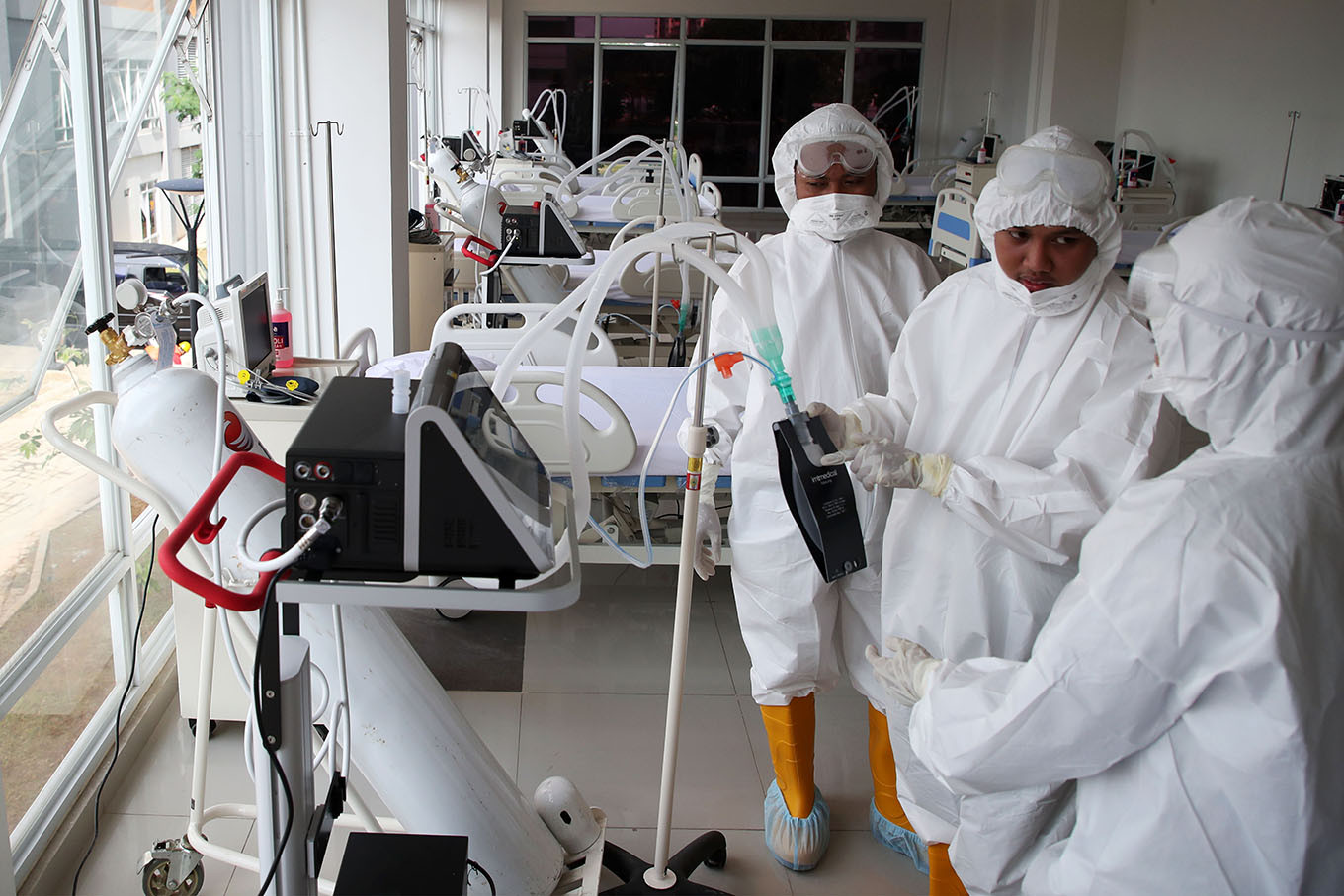Overwhelmed by patients from nearby cities, Jakarta turns to central government
Change Size
 Medical staff check the readiness of the equipment in the intensive care room of the COVID-19 emergency hospital at the former athletes village in Jakarta on March 23, 2020. (Kompas/Pool/Heru Sri Kumoro)
Medical staff check the readiness of the equipment in the intensive care room of the COVID-19 emergency hospital at the former athletes village in Jakarta on March 23, 2020. (Kompas/Pool/Heru Sri Kumoro)
J
akarta Governor Anies Baswedan has asked the central government to take over the COVID-19 response in Greater Jakarta -- which comprises Jakarta and its neighboring cities -- as the capital is running out of hospital beds as a result of the overwhelming number of patients from the nearby cities over which Jakarta has no jurisdiction.
Anies' deputy Ahmad Riza Patria was quoted by kompas.com as saying that the governor "already coordinated with the central government, hopefully they can take over to control the situation".
Riza said he expected that the central government would be able to improve health facilities in Greater Jakarta by adding more hospital beds, suggesting that the central government should take over the coordination for COVID-19 control in each region, especially when health facilities are overwhelmed.
In an Instagram post on Wednesday, the Jakarta administration said that its hospitals, as of Jan. 17, had only 13 percent of beds -- or about 1,011 isolation beds and 192 intensive care beds -- free to accommodate COVID-19 patients. It said that 24 percent of the total 8,890 isolation and intensive care beds were filled by patients from Tangerang -- which is under the Banten administration -- and Bogor, Depok and Bekasi -- three cities under West Java’s jurisdiction. The remaining 63 percent of beds were occupied by Jakarta patients.
Jakarta last week returned to the so-called large-scale social restrictions (PSBB) -- in place until Jan. 25 -- to prevent hospitals from being overwhelmed with COVID-19 patients and staff from being stretched thin.
But even then, Jakarta’s daily cases continue to soar, hitting an all-time record high of 3,786 new cases on Wednesday to bring the total cumulative tally to 236,075 cases. This broke the daily highs Jakarta recorded in the past couple of weeks, including the daily record of 2,959 new cases logged on Jan. 8, a day before Anies announced the return to full PSBB.
Jakarta accounts for a significant proportion of daily new cases in the country. The city currently has 21,224 active cases and has had 3,868 deaths.
Read also: Health violations rampant in Jakarta under renewed restrictions
Other provinces across Java island, such as Banten, West Java, East Java and Yogyakarta, have also been seeing high bed occupancy rates in the past few weeks.
South Tangerang in Banten reportedly is looking into the possibility of providing hotel rooms for self-isolating asymptomatic patients since COVID-19 hospitals in the city have started to run out of beds.
The central government is planning to add more hospital rooms to treat COVID-19 patients if Indonesia faces a case surge of 100 percent.
In Greater Jakarta, the government might cooperate with all hospitals in the region, according to Health Ministry spokesperson on COVID-19 affairs Siti Nadia Tarmizi, kompas.com reported.
"This will be discussed further because this will involve all parties, from the COVID-19 task force and ministries or state institutions,” she said as quoted by kompas.com.
Read also: 'Long road' to herd immunity even with COVID-19 vaccination
But health experts have warned that adding hospital beds is merely a quick fix that will eventually falter if the number of daily cases continues to rise, particularly when the testing gap between Jakarta and its neighboring provinces remains.
Health policy expert Ilham Akhsanu Ridlo said that the central government should instead amplify testing and tracing efforts as well as reinforcing health protocols and ensuring public compliance.
“These efforts should be able to help reduce the transmission speed, as well as buying enough time so that COVID-19 hospitals can improve the quality of their service in order to treat the patients effectively,” Ilham told The Jakarta Post.
The rate of testing in Jakarta has been nine times higher than the World Health Organization's minimum benchmark of 1,000 per 1 million people per week in the past three weeks, while Banten and West Java in general fell slightly below the benchmark, according to the WHO’s situation report on Jan. 20.
In an effort to slow down the COVID-19 transmission rate, the government has introduced several measures to restrict public mobility, with the latest being the 14-day public activity restrictions (PPKM) in Java and Bali starting from Jan. 11. On Thursday, the PPKM were extended to Feb. 8.









